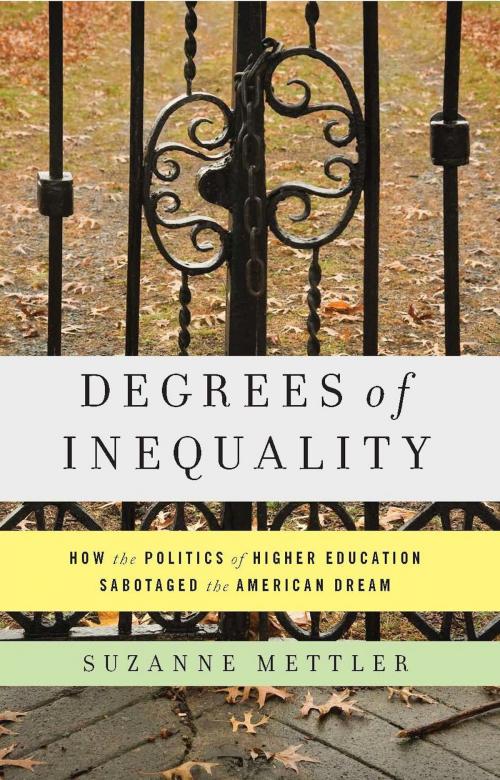Degrees of Inequality
How the Politics of Higher Education Sabotaged the American Dream
Nonfiction, Reference & Language, Education & Teaching, Educational Theory, Educational Reform, Social & Cultural Studies, Political Science, Politics, Practical Politics, Government| Author: | Suzanne Mettler | ISBN: | 9780465072002 |
| Publisher: | Basic Books | Publication: | March 4, 2014 |
| Imprint: | Basic Books | Language: | English |
| Author: | Suzanne Mettler |
| ISBN: | 9780465072002 |
| Publisher: | Basic Books |
| Publication: | March 4, 2014 |
| Imprint: | Basic Books |
| Language: | English |
America's higher education system is failing its students. In the space of a generation, we have gone from being the best-educated society in the world to one surpassed by eleven other nations in college graduation rates. Higher education is evolving into a caste system with separate and unequal tiers that take in students from different socio-economic backgrounds and leave them more unequal than when they first enrolled.
Until the 1970s, the United States had a proud history of promoting higher education for its citizens. The Morrill Act, the G.I. Bill and Pell Grants enabled Americans from across the income spectrum to attend college and the nation led the world in the percentage of young adults with baccalaureate degrees. Yet since 1980, progress has stalled. Young adults from low to middle income families are not much more likely to graduate from college than four decades ago. When less advantaged students do attend, they are largely sequestered into inferior and often profit-driven institutions, from which many emerge without degrees and shouldering crushing levels of debt.
In Degrees of Inequality, acclaimed political scientist Suzanne Mettler explains why the system has gone so horribly wrong and why the American Dream is increasingly out of reach for so many. In her eye-opening account, she illuminates how political partisanship has overshadowed America s commitment to equal access to higher education. As politicians capitulate to corporate interests, owners of for-profit colleges benefit, but for far too many students, higher education leaves them with little besides crippling student loan debt. Meanwhile, the nation s public universities have shifted the burden of rising costs onto students. In an era when a college degree is more linked than ever before to individual and societal well-being, these pressures conspire to make it increasingly difficult for students to stay in school long enough to graduate.
By abandoning their commitment to students, politicians are imperiling our highest ideals as a nation. Degrees of Inequality offers an impassioned call to reform a higher education system that has come to exacerbate, rather than mitigate, socioeconomic inequality in America.
America's higher education system is failing its students. In the space of a generation, we have gone from being the best-educated society in the world to one surpassed by eleven other nations in college graduation rates. Higher education is evolving into a caste system with separate and unequal tiers that take in students from different socio-economic backgrounds and leave them more unequal than when they first enrolled.
Until the 1970s, the United States had a proud history of promoting higher education for its citizens. The Morrill Act, the G.I. Bill and Pell Grants enabled Americans from across the income spectrum to attend college and the nation led the world in the percentage of young adults with baccalaureate degrees. Yet since 1980, progress has stalled. Young adults from low to middle income families are not much more likely to graduate from college than four decades ago. When less advantaged students do attend, they are largely sequestered into inferior and often profit-driven institutions, from which many emerge without degrees and shouldering crushing levels of debt.
In Degrees of Inequality, acclaimed political scientist Suzanne Mettler explains why the system has gone so horribly wrong and why the American Dream is increasingly out of reach for so many. In her eye-opening account, she illuminates how political partisanship has overshadowed America s commitment to equal access to higher education. As politicians capitulate to corporate interests, owners of for-profit colleges benefit, but for far too many students, higher education leaves them with little besides crippling student loan debt. Meanwhile, the nation s public universities have shifted the burden of rising costs onto students. In an era when a college degree is more linked than ever before to individual and societal well-being, these pressures conspire to make it increasingly difficult for students to stay in school long enough to graduate.
By abandoning their commitment to students, politicians are imperiling our highest ideals as a nation. Degrees of Inequality offers an impassioned call to reform a higher education system that has come to exacerbate, rather than mitigate, socioeconomic inequality in America.















